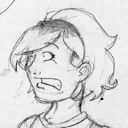A straight review this week. Those seeking humour and Cracked style images should jump right on down. Normal service will resume shortly.
Bed by David Whitehouse
‘Asleep he sounds like a
pig hunting truffles in soot.’
The opening sentence of David
Whitehouse’s debut novel, Bed, is shocking. Whereas the book jacket
blurb, in its few short lines, describes Mal as an impish, charismatic child
prone to bouts of extremely demonstrative naturism, the reader is instead
confronted by something far more unpleasant; the same character, seven thousand
four hundred and eighty-three days into a self-imposed, bed-bound state of
inertia.
From this moment on, it is clear that
Whitehouse takes great pleasure in such feats of misdirection. Although many
authors invite their readers to play armchair psychologist, Whitehouse takes
this to an extreme. Throughout vast swathes of text he uses his considerable
dexterity with language to paint, embellish and then repaint the scene.
Descriptions and wonderful, witty word-play mask the fact that, aside from
ever-accruing inches on Mal’s waistline, nothing much is happening. The image
could almost be a still life. Almost, but not quite. Undercurrents of motive,
emotion and desire course through every character in the book. As the reader
mines these motives, the meaning of the novel shifts and changes, never quite
merging into one clear explanation. This, then, is my reading of Bed.
It is clear that, on one level at
least, Bed is a novel about greed. This is made explicit in
the gratuitous descriptions of food that pepper the text. Mountains of
this and slabs of that disappear into Mal’s gullet as he
ingests everything in his path. But it is intimated that it is also his
emotional greed that has brought the family into the situation in which we find
them. The blandness of the narrator (Mal’s brother) is easy to understand
when brought into contrast with Mal’s character. Mal’s personality, his flaws
and his charm alike, dominate the life of the family and set the tone
throughout their shared childhood. Like the unnamed narrator in Rebecca,
our hero fades into the background when faced with such otherness.
Mal wants to be different, to be special, and so the whole family succumbs to
his bizarre desire, thereby facilitating the transformation.
However, as Whitehouse’s spotlight
shifts and refocuses, another interpretation presents itself. It begins to seem
as if it is perhaps Mal’s mother’s greed around which the plot is centred.
Slavish devotion is rarely allied with selfishness, but in her case it
certainly appears to be so. In the chapters dealing with Mal’s teens and
early twenties his mother seems restless and unhappy. When he moves out she is
inconsolable. But when he returns, vowing never again to leave his bed, her
focus is restored and she sets about the task of caring for him, perversely
accepting his choice and literally drawing a curtain on ex-girlfriend Lou and on
a world which threatens to break up her treasured family unit.
Bed is also very much a novel about love,
and the need people have to channel and focus that love into some thing or some
person that is theirs and theirs alone. In this way, the book’s themes are
inextricably linked; love is greedy, selfish and potentially disastrous. When
the book’s characters are left without a focus for their emotions they become
shadows of their former selves. This is demonstrated, as previously mentioned,
by Mal’s mother as she struggles to accept her child growing up and forming
ties stronger than those she has to him (not unlike the character of Judith
in Cold Comfort Farm), but also by Lou’s father who shrinks into a
grey, listless version of himself when his idealised vision of love is
shattered on two occasions by infidelity.
Returning to the issue of the
book’s ‘meaning’, no resolution is immediately apparent. It is certainly almost
impossible to accept Mal’s proclamation of loving selflessness as he is hoisted
from his bed:
‘You destroyed this family.’
‘No… I saved it.’
This has enraged some readers. Janet
Maslin tore into the book’s apparent lack of message in the New York
Times, bemoaning:
“As to questions
like how Mal got into this situation and what might get him out of it, Mr.
Whitehouse was at a loss for interesting answers.”
But it seems to me
(sitting in my temporary psychiatrist’s armchair) that, in looking for an
explicit rationale, Maslin is entirely missing the point. Whitehouse’s novel is
a tribute to the power which language has to amuse, to repulse, to suggest and
infer. Fans of unusual narrative voices and darkly comic stories, such as those
of Dahl and Saki, will appreciate that presenting the reader with easily
digestible answers would transform the subtleties and clues buried in the prose
into so many red herrings, thus depriving us of the satisfaction of drawing our
own conclusions.

































